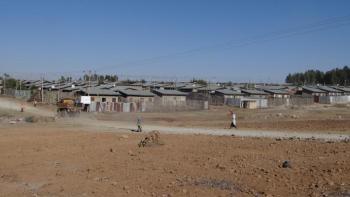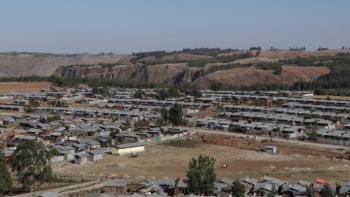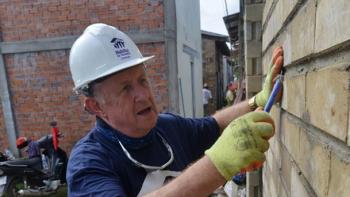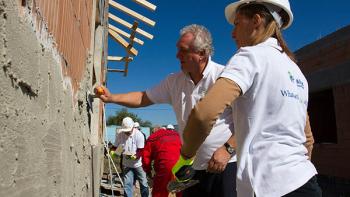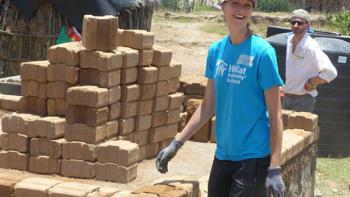Country Facts:
- Capital city – Addis Ababa
- Population – over 127 million
- Life expectancy – 65 years
- Unemployment rate – 4%
- Below poverty line – 24%
* countrymeters, 2024, International poverty line of US$2.15 (World Bank)
Habitat Facts
- Habitat started in Ethiopia in 1993.
- Individuals served in FY2024 – 29, 079
- Through new construction – 85
- Through incremental construction– 28,994
- Through civil society facilitation – 82
The housing need in Ethiopia
About 70% of housing units in Ethiopia require total replacement. Most homes are made of wood and mud and have cracked walls, leaking roofs and dirt floors. Only one-quarter of houses have two or more rooms.
At the national level, only 28% of households have access to adequate sanitation facilities. More than 43% use open pits or pit latrines without slabs, and 38% have no toilet facilities at all. Only 57% of the country’s population have access to safe drinking water, and this figure is significantly higher in rural areas.
Four-fifths of the capital city of Addis Ababa are considered as a
slum area, characterized by widespread sanitation challenges.
In these urban neighborhoods, families live in crowded rooms and are exposed to health and safety risks.
How Habitat addresses the need
Urban slum upgrading main project
Habitat Ethiopia assists vulnerable families living in poverty by renovating homes and providing access to improved sanitation and safe water facilities, such as clean water points. This multi-year project in the capital Addis Ababa ensures the sustainable use of facilities and creates a healthy living environment through hygiene and sanitation training.
Regional water, sanitation and hygiene project
Habitat Ethiopia will support more households in Oromia and Amhara regional states through construction of WASH infrastructure for partner communities. Interventions include the construction of reservoirs, water pipelines, and water points in Negele Arsi area and Shewarobit area. Additionally, hygiene and water management training will be provided for community members and water committees to ensure sustainability.
Resilience building in disaster affected communities (RBDC) project
The Gofa region Landslided Resilience Building Project aims to build resilience for communities by constructing new houses and spring water development; the project supports more than 400 households in disaster affected area in Gofa zone of southern Ethiopia Region.
The DR3 project also includes mitigating urban flood risks through Green-Gray Infrastructure and Inclusive Solid Waste Management in the town of Dire Dawa. This project aims to benefit 80,000 individuals through nature-based solutions and creates employment opportunities for youth.
What you can do
DONATE
Please visit habitat.org/donate and select “Designate your donation” to Habitat Ethiopia.
TITHE
Habitat affiliates in the U.S. support the international work through an annual tithe. For additional information, email [email protected] or contact your local Habitat organization.
VOLUNTEER
The Global Village program is resuming region by region until a safe and quality experience can be provided at scale worldwide. Please visit habit.org/gv for more information and updates.
Contact
Habitat for Humanity Ethiopia, P.O.BOX: 8953, Addis Ababa, Ethiopia. Phone: (+251) 116 600 195 Email: [email protected], Website: habitatethiopia.org

